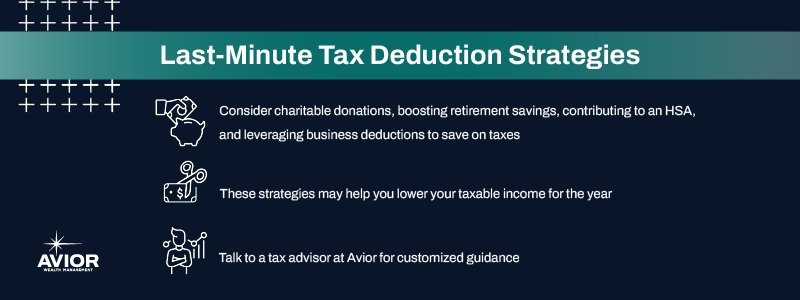Last-Minute Tax Deduction Strategies
Even if you’re tax planning at the last minute, you can take advantage of these deductions to lower your taxable income.

As you’re preparing for tax season, you may be thinking about all the ways you can maximize your deductions and credits while minimizing your tax liability. If you’re not aware of all the opportunities available to you, you could miss out on significant tax savings.
Exploring options like donations, retirement contributions, and business expenses may help open up areas you’ve overlooked. This guide walks through last-minute tax deduction strategies that can help you lower your tax bill and improve your overall financial health.
Benefits of charitable donations
One thing to consider that can help maximize deductions is charitable donations. Charitable contributions not only allow you to support the causes you believe in but also offer tax advantages like:
- Income tax deductions: When you make qualifying charitable donations to eligible organizations, you can deduct what you donated from your taxable income. This can reduce the amount of income subject to taxation.
- Itemized deductions: Charitable contributions are typically claimed as itemized deductions on your tax return. Itemizing deductions may be more beneficial than taking the standard deduction, especially if you have significant charitable giving.
To maximize deductions from charitable donations and ensure compliance with tax regulations, consider the following tips:
- Keep detailed records: Maintain thorough records of all charitable contributions, including receipts, acknowledgment letters from charities, and documentation specifying the amounts donated.
- Verify eligibility: Only contributions made to qualified charitable organizations are eligible for deductions. You can confirm a nonprofit is a recognized tax-exempt organization by checking the IRS’s tax-exempt organization tool.
- Understand donation limits: There are limits on charitable deduction amounts. Generally, individuals can deduct up to 60% of their adjusted gross income for cash donations, but this may vary for certain types of contributions.
- Consider non-cash contributions: Non-cash contributions, such as donations of goods or property, can also be deducted. However, the value must be accurately assessed, and specific rules apply. You will need to research fair market value.
Examples of eligible charitable contributions include monetary donations, contributions of clothing or household items, donations of vehicles, and even volunteer expenses directly related to charitable activities.
Another tax deduction strategy to consider is contributing to retirement accounts. We’ll dive into that next.
Boosting retirement contributions
Contributing to retirement accounts offers many different tax benefits, making them powerful tools for financial planning.
Contributions to traditional IRAs and 401(k)s are made with pre-tax dollars, allowing investments to grow tax-deferred until withdrawal during retirement. This deferral can lead to significant compound growth over time. Additionally, these contributions are often tax-deductible, reducing your taxable income for the year of contribution. This can result in immediate tax savings.
While Roth IRAs and Roth 401(k)s are funded with after-tax dollars, qualified withdrawals, including earnings, are tax-free. Roth contributions can provide tax-free income in retirement.
Contribution limits are set by the IRS and can change annually. For 2024, the annual contribution limit for IRAs is $7,000 (or $8,000 if you’re 50 or older), and for 401(k)s, it is $23,000 (or an extra $7,500 for those aged 50 and older).
Increasing your contributions to retirement accounts not only boosts long-term savings but can also lead to lower taxable income.
By understanding these tax benefits and guidelines, you can make informed decisions to optimize your savings, reduce your tax liabilities, and work toward a financially secure retirement.
Now, let’s look at leveraging last-minute business expense deductions for tax savings.
Leveraging last-minute business expense deductions
Accelerating deductible business expenses before year-end is a strategic approach for small business owners and self-employed individuals to optimize their tax situation. You can potentially reduce your taxable income. Here are some deductible business expenses that can be accelerated, along with strategies to maximize deductions:
Prepaying expenses
If you lease business space or equipment, consider prepaying rent or lease payments for the upcoming months before the year’s end. You could also prepay insurance premiums, subscriptions and memberships, or marketing and advertising costs.
Equipment purchases
Small business owners can take advantage of Section 179, which allows for the immediate expensing of qualifying business equipment purchases. The deduction limit and eligible expenses can vary, so check current regulations and talk to a tax expert.
Additionally, consider bonus depreciation, which allows for an additional deduction on qualifying property purchases.
Home office expenses
If you have a home office, accelerating payments for utilities, repairs, and maintenance can increase deductions. If eligible, consider accelerating the depreciation on the portion of your home used for business purposes.
Employee bonuses and benefits
If you have employees, paying employee bonuses before year-end can be deducted in the current tax year. Additionally, prepaying employee benefits, such as health insurance premiums, before year-end can also accelerate deductions.
The timing of your deductions may vary based on the accounting method used (cash or accrual), so understanding the implications of each is crucial. Work with a financial professional to maximize deductions and optimize your tax position.
Next, we’ll cover health savings and flexible spending accounts as tax savings vehicles.
Using health savings accounts and flexible spending accounts
Contributing to health savings accounts (HSAs) and flexible spending accounts (FSAs) offers valuable tax advantages while helping you manage healthcare expenses.
HSAs provide a triple tax advantage. Contributions are tax-deductible, earnings within the account grow tax-free, and withdrawals for qualified medical expenses are also tax-free. Unspent funds in an HSA can roll over from year to year and continue to grow, providing a source of long-term savings for healthcare expenses in retirement. HSAs are portable, meaning the account remains with the individual even if they change jobs or health plans, providing flexibility and continuity of savings.
Contributions to FSAs are made with pre-tax dollars, reducing your taxable income and ultimately lowering your overall tax liability.
For HSAs and FSAs, contribute the maximum allowable amount each year to maximize tax advantages. Consider funding HSAs and FSAs at the beginning of the plan year to maximize the benefits of tax-free growth.
Finally, let’s go over how to use education expenses for tax deductions next.
Education expenses and tax deductions
Tax deductions and credits for education expenses can provide significant financial relief if you’re pursuing higher education or supporting your dependents in educational endeavors. Eligible taxpayers can deduct up to $4,000 from taxable income for qualifying tuition and related expenses paid during the tax year. Additionally, up to $2,500 in student loan interest may be deducted if the payments qualify.
As the tax year comes to a close, many individuals and businesses are seeking last-minute tax deduction strategies.
By exploring actionable tips like charitable donations, retirement contributions, and deductible business expenses, you can make informed decisions that potentially lower your tax liabilities and enhance your financial health.
Work with Avior to create a tax planning strategy
Understanding these last-minute deduction opportunities can help you maximize your tax savings this year. However, when you have a complex tax situation or you still have questions, work with the team at Avior. We can break down tax regulations for you and align your strategy with your goals.
Disclaimer: Nothing contained herein should be construed as legal or tax advice. Avior and our Advisors will work with your attorney and/or tax professional to assist with your legal and tax strategies. Please consult your attorney or tax professional with specific legal and/or tax questions. Investment Management and Financial Planner are offered through Avior Wealth Management, LLC, an SEC-registered investment advisor. Past performance is not a guarantee of future results. Investments are subject to loss, including the loss of principal.
No Comments
Sorry, the comment form is closed at this time.




